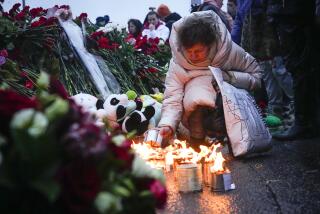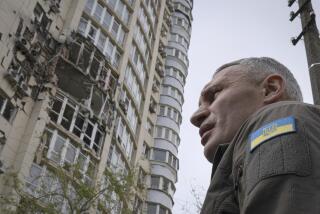Moscow’s 850th Birthday Party Has Select Guest List
- Share via
MOSCOW — Neither snow nor rain, neither good taste nor individual freedom was allowed to intrude Friday on the start of an 850th birthday bash for this dolled-up capital whipped into a festive frenzy for a few thousand high-rolling guests.
Moscow is celebrating the contrived anniversary with three days of concerts, open-air theater and high-tech wizardry, ostensibly to revel in the glamorous transformation of this once-drab metropolis in the six years since it jettisoned communism.
But the exclusive nature of the party and the $60 million lavished on garish decorations, weather manipulations and the 80,000-person security contingent have led many to conclude that the more this country changes from its Soviet-era excesses, the more life stays the same.
With the major events staged for VIPs only, the toiling masses got the message early and mostly fled to the countryside to escape citywide traffic tie-ups and frequent document checks.
No one is really sure of the exact date of Moscow’s founding, but the name given the fortress encampment that was eventually to become the Kremlin first appeared in literature in 1147, and city officials have been marking the event in early September for as long as anyone remembers.
Organizers spent three years planning and primping for the 850th birthday, and no one here dared suggest that festivities be toned down in deference to the somber mood elsewhere as it was announced that Mother Teresa had died and the world prepared to bury Britain’s Princess Diana. Instead, Russian leaders focused on the desire to mark this city’s passage into a post-Communist era.
“People have changed. They have become more upright, more joyful, more free,” President Boris N. Yeltsin said as he congratulated the city and the invited dignitaries on bustling Tverskaya Street, now flanked by exclusive boutiques, shops and restaurants.
The much-trumpeted holiday was the brainchild of Moscow Mayor Yuri M. Luzhkov and is widely considered the start of the populist dynamo’s undeclared campaign for the Russian presidential election in 2000.
“People need celebrations to inspire in them hope for a better future,” Luzhkov said in a rare interview with the Nezavisimaya Gazeta newspaper on the eve of the celebration.
Much of the controversy that has swirled around the costly cocktail of history, culture and politics was sparked by the omission of average Russians from the main events.
The opening ceremony Friday on Tverskaya Street, a Bolshoi Ballet performance in Cathedral Square in the Kremlin and the extravagant drama “Our Ancient Moscow” staged at Red Square by filmmaker Andrei Konchalovsky--including 1,200 performers and a mechanical dragon--touched the common people only with the traffic snarls caused by street closures and VIP motorcades.
“The only occasion that can compare to the current orgy of hysterical agitation in the city is the general exultation over the 100-year anniversary of the birth of Vladimir Ilyich Lenin” in 1970, observed Artem Troitsky, columnist for several Moscow newspapers. “There are no depths of stagnation to which the authorities will not sink.”
To ensure that unwelcome elements wouldn’t rain on the mayor’s parade, the city deployed aircraft to seed clouds approaching Moscow--a time-honored tradition of weather-making carried on from the Soviet era.
Access to Moscow has also been restricted for Russians outside the capital. One Muscovite complained to the newspaper Moskovsky Komsomolets that he was unable to buy a return train ticket from a business trip to Belgorod because railroad authorities had been ordered to supply passage only to official delegations.
While the celebration has mostly been aimed at the elite, this city’s 10 million residents have garnered some benefits from the birthday.
Central streets have been repaved, the towering Christ the Savior Cathedral that was razed by dictator Josef Stalin has been rebuilt, and hundreds of historic buildings have been spruced up for the occasion.
One other consolation is that the splashiest event of the weekend should be the most accessible: Tonight’s sound-and-light show by French laser-technology wizard Jean-Michel Jarre will be projected onto the hilltop facade of Moscow State University and should be visible from embankments and apartment windows well beyond the reserved seating.
One university official, though, has warned the city of his fears that a huge turnout on the vast square in front of the Stalinscraper could lead to disaster. Nikolai Strochkov told news agencies that numerous cellars and subterranean passages run below the square and that the ground could give way if too many spectators crowd together to watch the show.
A closing ceremony Sunday, which includes a light show that will project an image of the Virgin Mary onto the skies, is restricted to 15,000 ticket-holders at Luzhniki Stadium. But a fireworks finale scheduled to be staged throughout Moscow will be visible to ordinary revelers.
More to Read
Sign up for Essential California
The most important California stories and recommendations in your inbox every morning.
You may occasionally receive promotional content from the Los Angeles Times.














